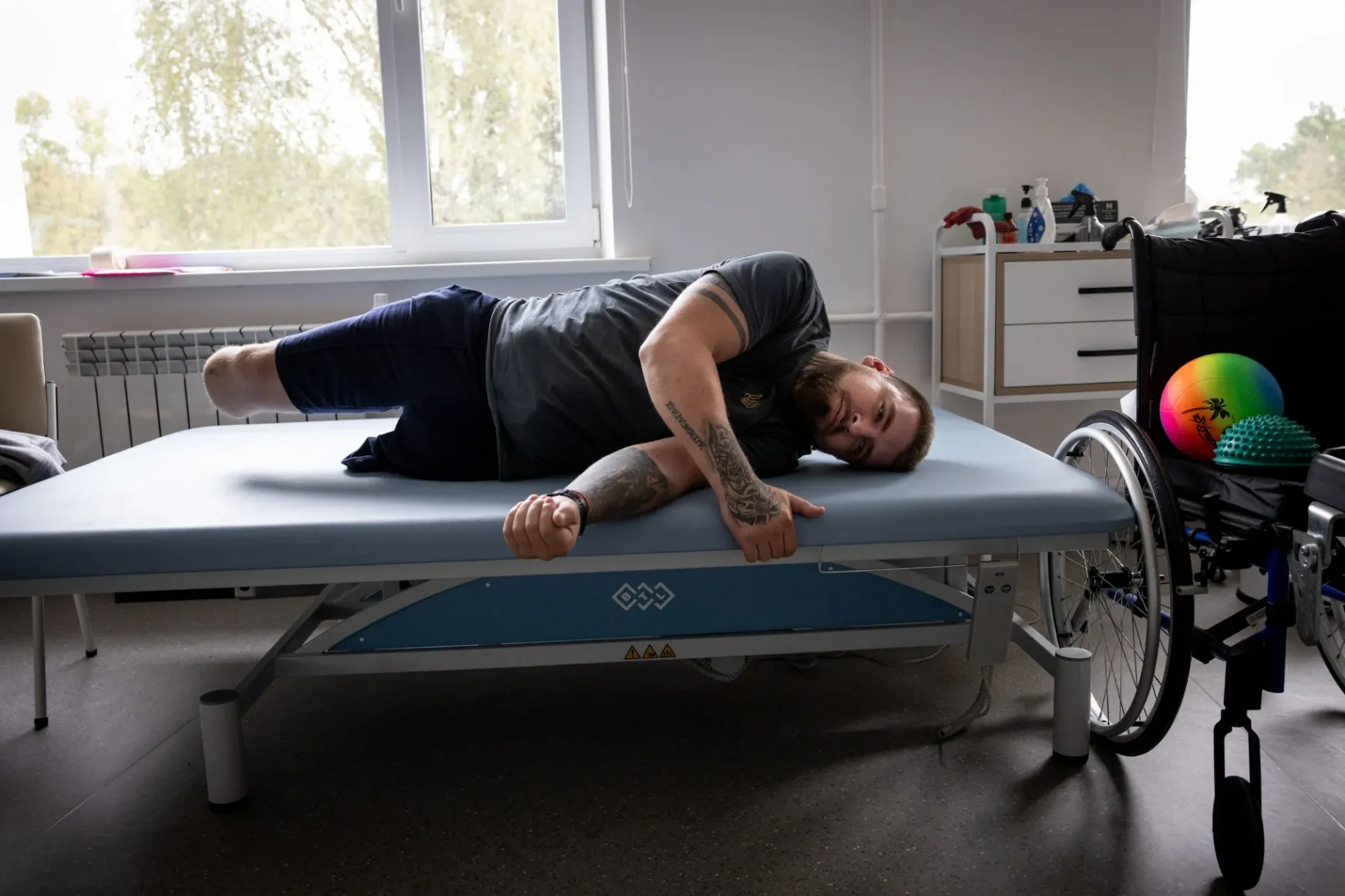
When I came to, I could sense that there was something very wrong with my legs
Alina Vyatkina joined the uprising in November 2013, at the very beginning of the Maidan protests. She was eighteen years old. For three months, she and tens of thousands of others remained outside in Kyiv's main square. She was also there when one of her closest friends, then 19-year-old Ustim Holodnyuk, was shot in the head by a sniper while trying to help wounded activists at the exit of the Khreshchatyk metro station. Following Russia's full-scale invasion of Crimea in March and the outbreak of armed conflict in eastern Ukraine, Alina began volunteering by delivering medical supplies to the Ukrainian army, sometimes even hitchhiking to the battle front. By the end of the year, she felt like she had done all she could as a volunteer. So she decided to become a military nurse.
„After five years of psychotherapy, I came to the realization that I had joined the medical battalion partly out of guilt,” says Alina in her office in downtown Kyiv, more than two and a half years after Russia launched a total invasion of Ukraine. „I felt guilty for not being able to save my friend in Maidan. More than ten years have passed since then, but I am still working through it in therapy.” Another factor in her decision was that her friends on the front lines often spoke about the fact that military doctors and nurses were reluctant to evacuate soldiers during bombings. „I came to the conclusion that somebody had to do it.”
Starting in early 2015, she served for a total of nine months. She says she adapted quickly, and the war taught her to appreciate the simple things: the smell of flowers, people's kindness, or joking with a comrade on a walkie-talkie. But the guilt followed her there too. It would resurface when a soldier died of their injuries during an evacuation, or when it was not possible to evacuate everyone in time. In the meantime, her physical health deteriorated: today, she says, her body is far from functioning like that of other 28-year-olds. She had kept it a secret from her mother for a long time, telling her that she was volunteering at a military base in Ivano-Frankivsk Oblast, far from the fighting in eastern Ukraine at the time, cooking borscht for soldiers. It was only three or four months later that the truth came out, when Alina accidentally let slip. „My husband is a soldier, so now I know exactly what it feels like to wait for someone to come home from the front," said Alina. „I also know that waiting is much harder than actually being on the front lines, because other people's decisions can have a profound impact on the life of the person you love. And you can't influence those decisions.”
Alina has been studying to be a psychologist and is now the head of Vilʹnyy Vybir, an organization that helps decommissioned soldiers and their families — which makes her a veteran, a soldier's wife and a support specialist. She knows first-hand the trauma that those serving on the front line go through, and also the strain that the Russian invasion of Crimea, with its annexation of the peninsula and support for the breakaway states in eastern Ukraine, has taken on the families of those on the front lines for more than a decade. Each role would be a struggle in its own right, but among Ukrainians today, it is rare to see only one side of the war.
In early October, we spoke to more than thirty people in Ukraine about the mental effects of the war, and it was clear that almost everyone had a mix of roles. We met psychiatrists who had fled to Transcarpathia from the east and south and were now practicing there, a former Olympian who still makes the trip home to battle-torn Zaporizhzhia to provide swimming therapy to veterans, and we visited a rehabilitation clinic where they couldn't keep count of how many of their employees' husbands were fighting on the front.
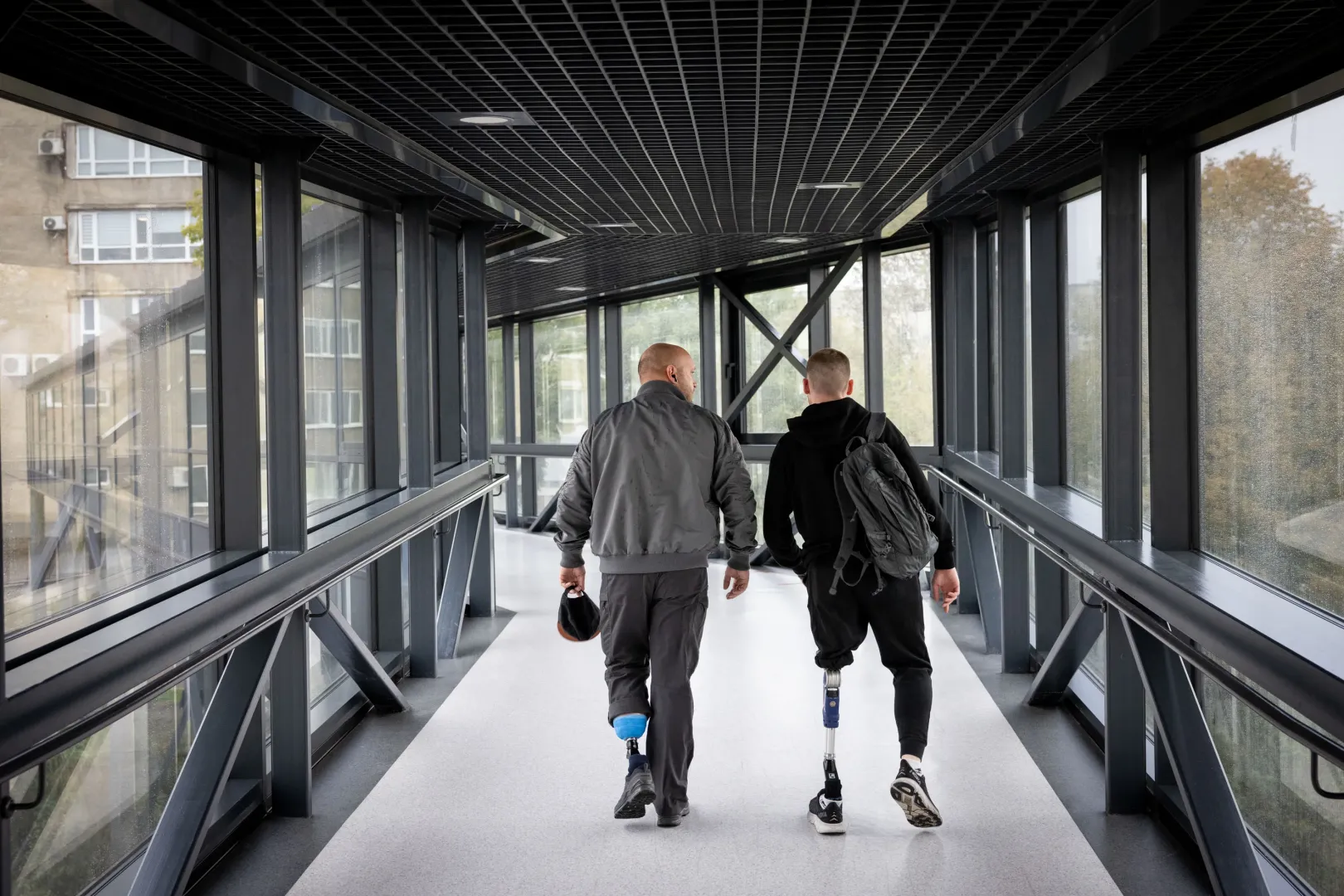
As in every war, besides the military, geopolitical and economic perspectives, there is an almost invisible psychological front. On this front, Russia is doing everything it can to break Ukrainians psychologically, who need more and more strength just to get through everyday life with their sanity intact. In this two-part series, we take a look at the psychological impact of the war on Ukrainians: what the most vulnerable groups (including wounded or decommissioned soldiers and their families, refugees, those released from Russian captivity or the Ukrainian children deported to Russia) are going through, how various organizations and experts are trying to help them, and what those who, at first glance, seem less exposed to the events are experiencing. We have spoken to veterans, ex-prisoners of war, soldiers only just recovering from their injuries, refugees who have been living hundreds of kilometers from their homes for years, and ordinary civilians. Each of their stories reveals a fragment of the pain that pervades the Ukrainian nation and the trauma that war inevitably brings.
In her detailed book on the effects of war, Trauma and Healing, American psychiatrist Judith Herman, a pioneer in trauma research, writes that when traumatic events are caused by natural disasters, those who only bear witness to the events from the outside (e.g. from countries untouched by the events) are quick to sympathize with the victim. But when the traumatic events are brought about by other humans, those who bear witness are caught in a conflict between victim and perpetrator. „It is morally impossible to remain neutral in this conflict. The bystander is forced to take sides. It is very tempting to take the side of the perpetrator. All the perpetrator asks is that the bystander do nothing. He appeals to the universal desire to see, hear, and speak no evil. The victim, on the contrary, asks the bystander to share the burden of pain. The victim demands action, engagement, and remembering.”
I.
„During the initial aftermath of my injury, I was depressed. I didn't know how I was going to live after that. I felt as though, in this condition, I wouldn't be needed by anyone anymore.” We are introduced to Dmitro at Recovery's rehabilitation center in Kyiv, which specializes in the complex rehabilitation of injured soldiers. He had been wounded in a Russian artillery and drone attack and lost both of his legs. „I was also afraid that she would leave me,” he looks at his fiancée sitting on the bed next to him and blows a kiss. „It's thanks to her that I'm doing much better now.”
Dmitro volunteered to join the army in 2019. A native of Dnipropetrovsk region, he was training to be a professional footballer and was a member of FC Kryvbas Kryvyi Rih's U19 team. He later went into logistics and was a security guard before joining the army. Although he completed his pilot training, he had always been afraid of flying so after the Russian invasion in February 2022, he was assigned to a ground unit. He then spent six months in air defense before transferring again, this time to artillery. For the first three months everything was fine, no one got wounded. They were allowed to go home and rest, and then on one occasion during another three months of service, his unit was hit by artillery, followed immediately by two drone attacks.
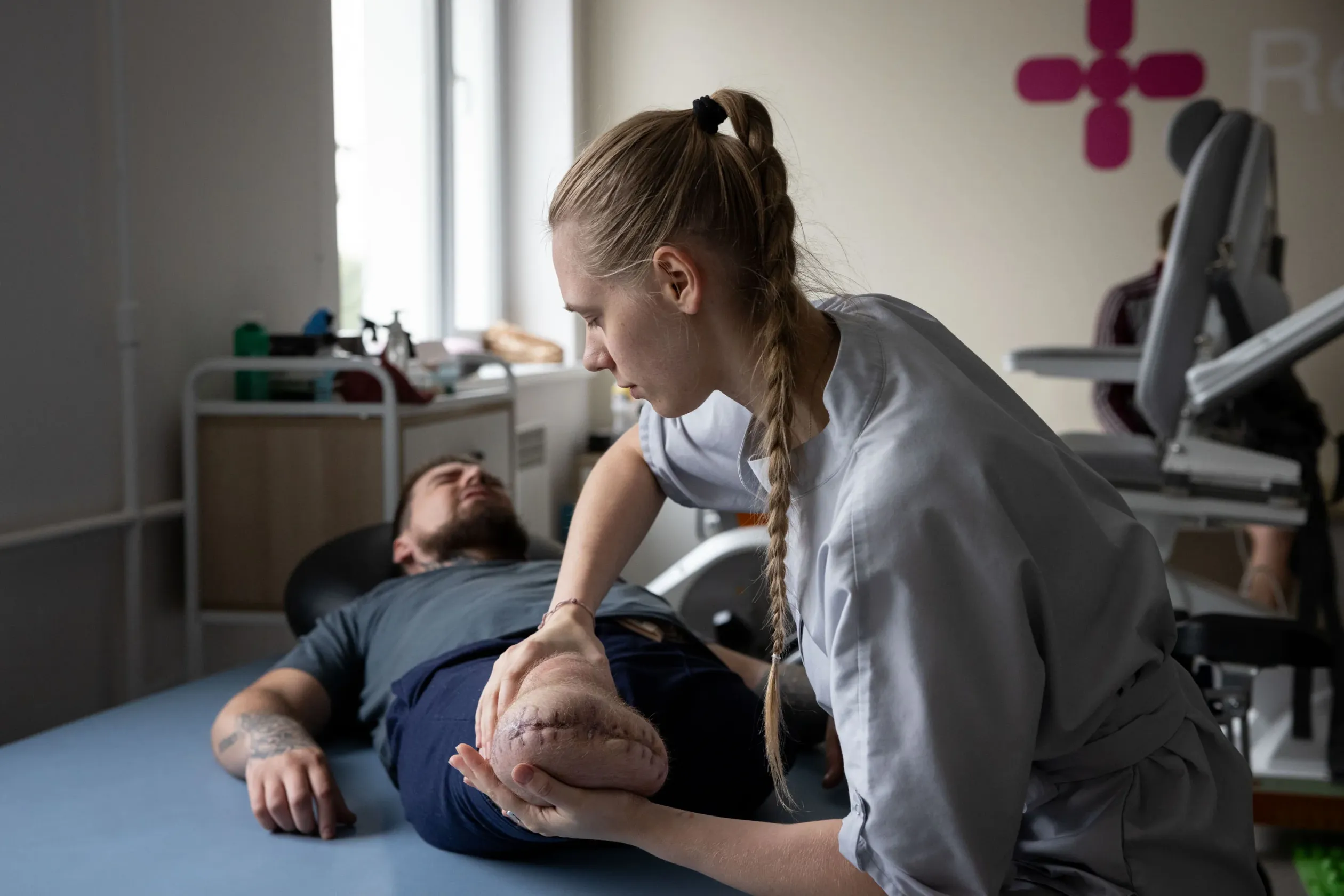
„We were on our way back to the base after the first hit when we heard the drones. One hit the back of our vehicle and the other exploded underneath us. I lost consciousness. When I came to, I could sense that there was something very wrong with my legs and torso. I saw that one of my comrades was also injured. The others continued to try to extricate us, but they radioed to us that a third drone was approaching. So they took us into the woods, covered us with leaves to hide us, left one guy with us so we could communicate, and went back to the base for help. I heard the other drone approaching, it must have been at canopy height, not far from us. I was terrified that this one would strike us too.”
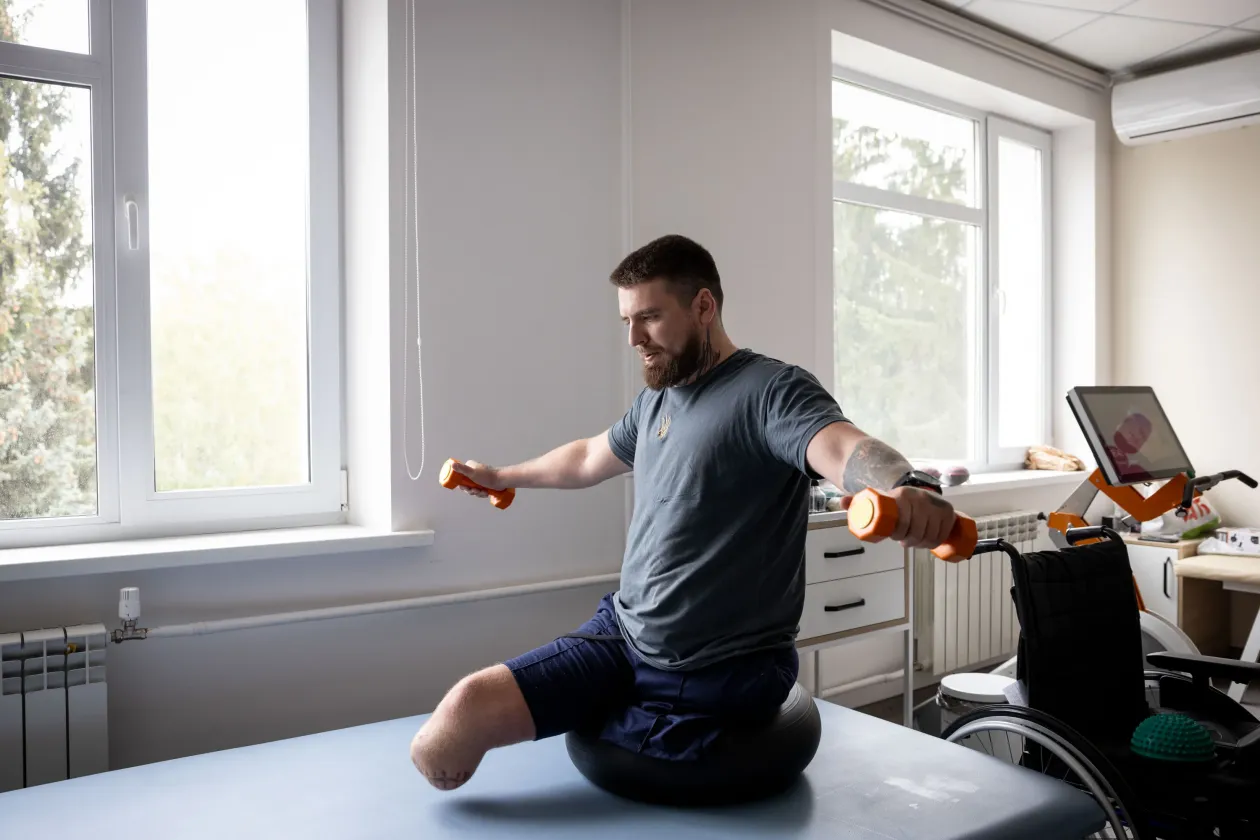
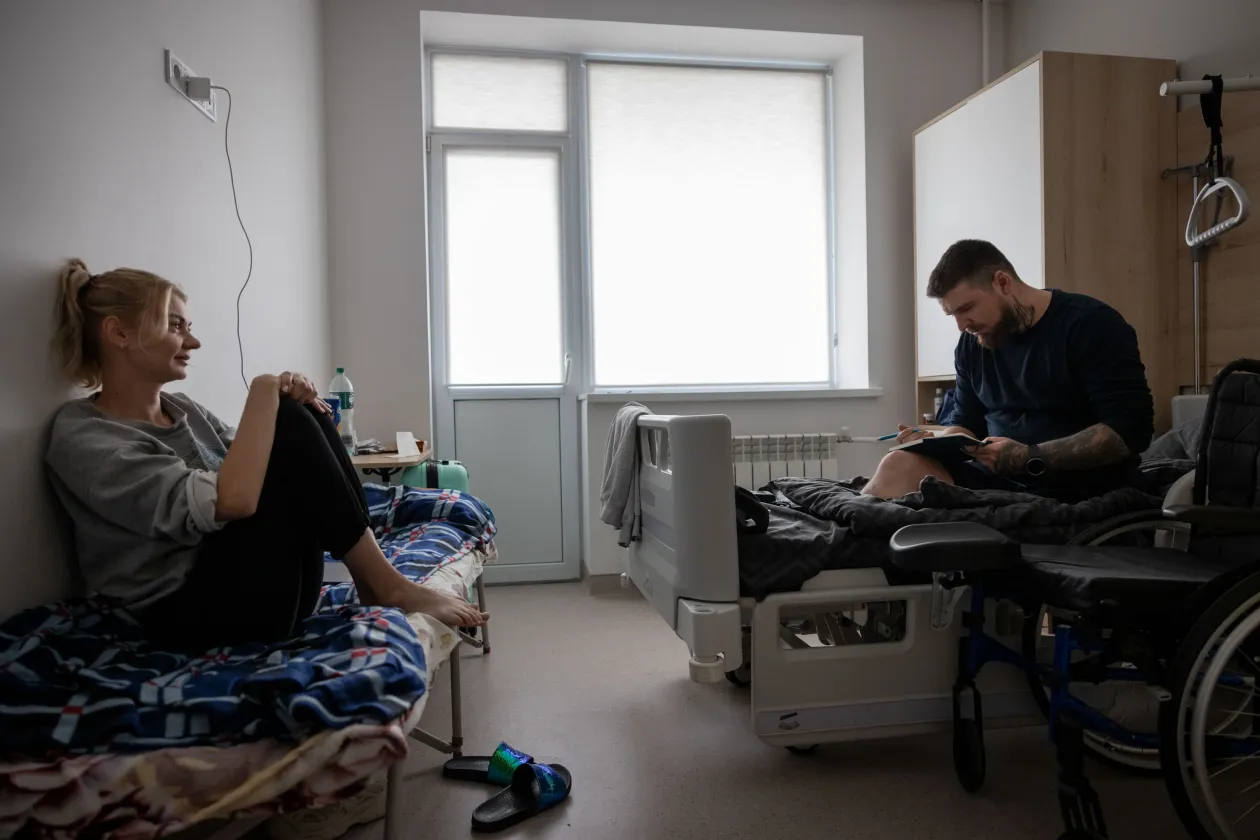
Ultimately, the drone hit the empty vehicle, but that didn't reassure Dmitro. He could feel that he was terribly thirsty, and he was convinced that this was the end for him. He exchanged a few quiet sentences with his comrades, and finally, twenty minutes later, the evacuation team arrived. They put him in a vehicle and he blacked out again. He remembers waking up once more in the basement of a building, vaguely aware that his clothes had been cut off. The next time he woke up, he was in a hospital in Dnipropetrovsk Oblast, his left leg having been amputated. Doctors spent a week trying to save the right one, but it was so shattered and infected from the knee down that they eventually decided to amputate it too before he died of complications. Several of his organs had also been damaged in the attacks and required surgery. Over the following months, he was treated in several rehabilitation clinics, and at the time of our visit he had been at Recovery in Kyiv for a month. He said the physical rehabilitation is still difficult, but he feels it's somewhat easier than before: he can now sit, kneel and doesn't feel the excruciating pain he used to feel when he turns onto his left side. And, perhaps more importantly, he feels better mentally.
The soldiers who come are not here for surgery but rehabilitation, explains Rostislav Andrusenko, head of the Kyiv rehab center. Some of them are sent here immediately after evacuation, others come from military hospitals. Recovery maintains thirteen rehabilitation centers in Ukraine's state hospitals, with a total of sixteen thousand injured soldiers treated so far – the aim is to establish five more centers by the beginning of 2025, so that 25 thousand soldiers can be rehabilitated each year. The organization was founded in 2022 by Viktor and Olena Pinchuk: the art-loving oligarch and his wife raised the initial capital from the sale of a work by Jeff Koons, famous for his iconic balloon dog sculptures, and still serve as the project's major donors. Most of those admitted to the hospital suffer from serious concussions, head or back injuries or loss of limbs. The Ukrainian National Health Service covers the cost of rehabilitation in public health institutions, including the time spent in Recovery. According to regulations, a rehabilitation cycle is at least two weeks, and a patient is entitled to two to eight cycles a year, depending on his or her injury. Andrusenko says the average stay is three to four weeks.
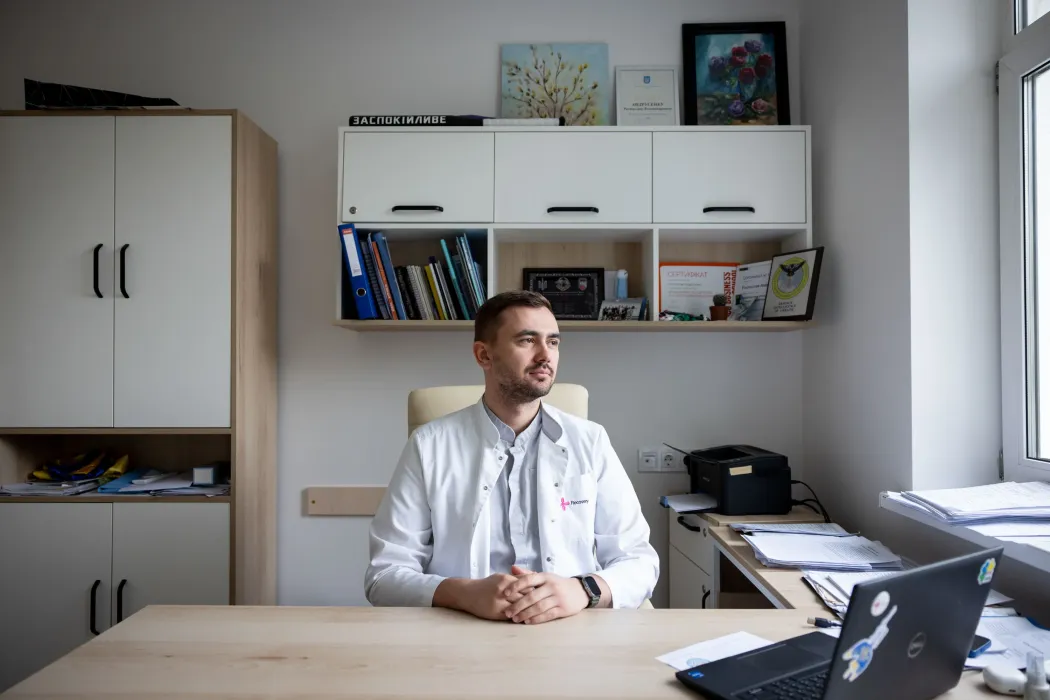
When an injured soldier arrives, they are first thoroughly examined and then a multidisciplinary team of doctors, physiotherapists, psychologists, psychotherapists, psychiatrists, speech therapists is put together to lay out the rehabilitation plan. One of the most important steps is to ask the patient what goal they would like to set for their recovery. Andrusenko says most of them already have some kind of idea, such as wanting to run or hold their child in their arms. They then develop an appropriate treatment schedule between different specialties, and if necessary, bring in additional specialists, for example if someone needs a prosthesis. In order to help the injured person achieve their goal, doctors and psychologists have to support them in such a way that does not permit them to lose touch with their new reality but rather helps them to accept it, for example after the loss of a limb. Andrusenko says another difficulty in their work is that most soldiers return to the army after recovery, even if not always directly to the front lines.
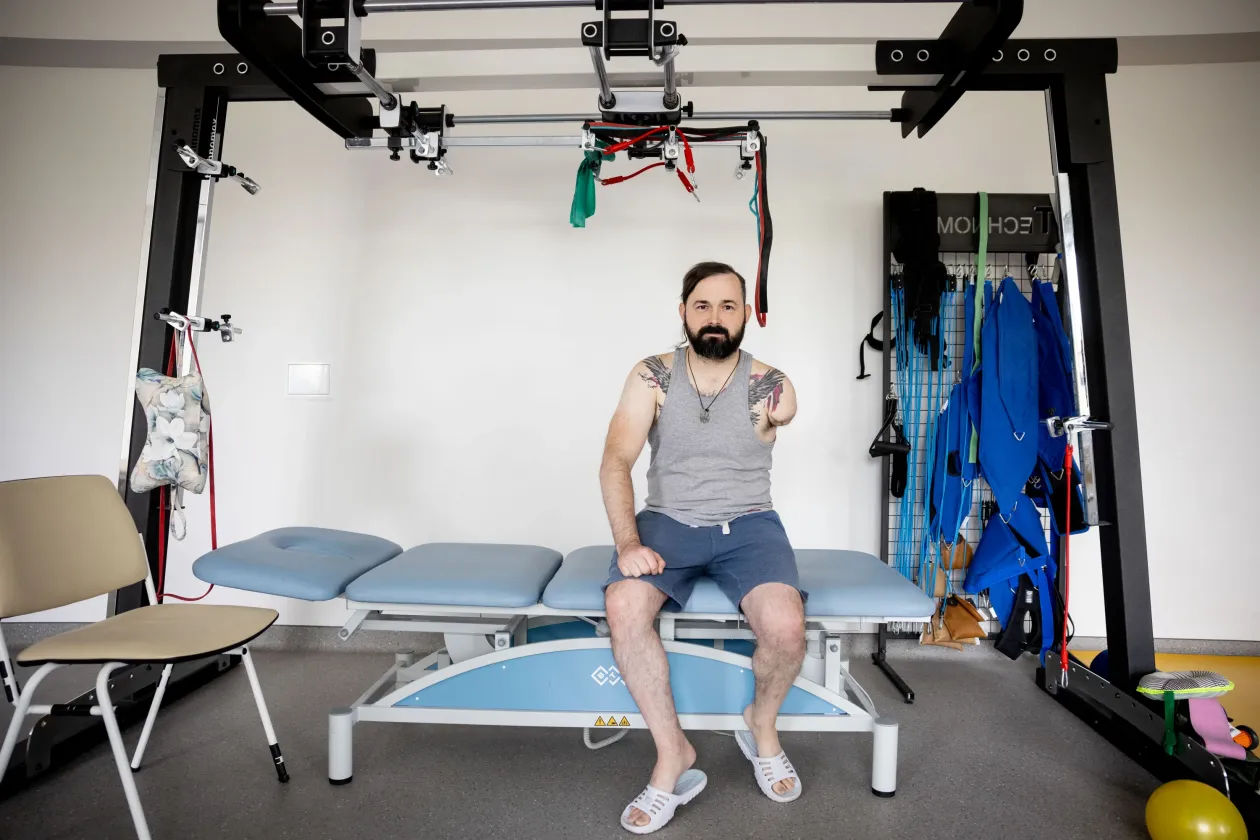
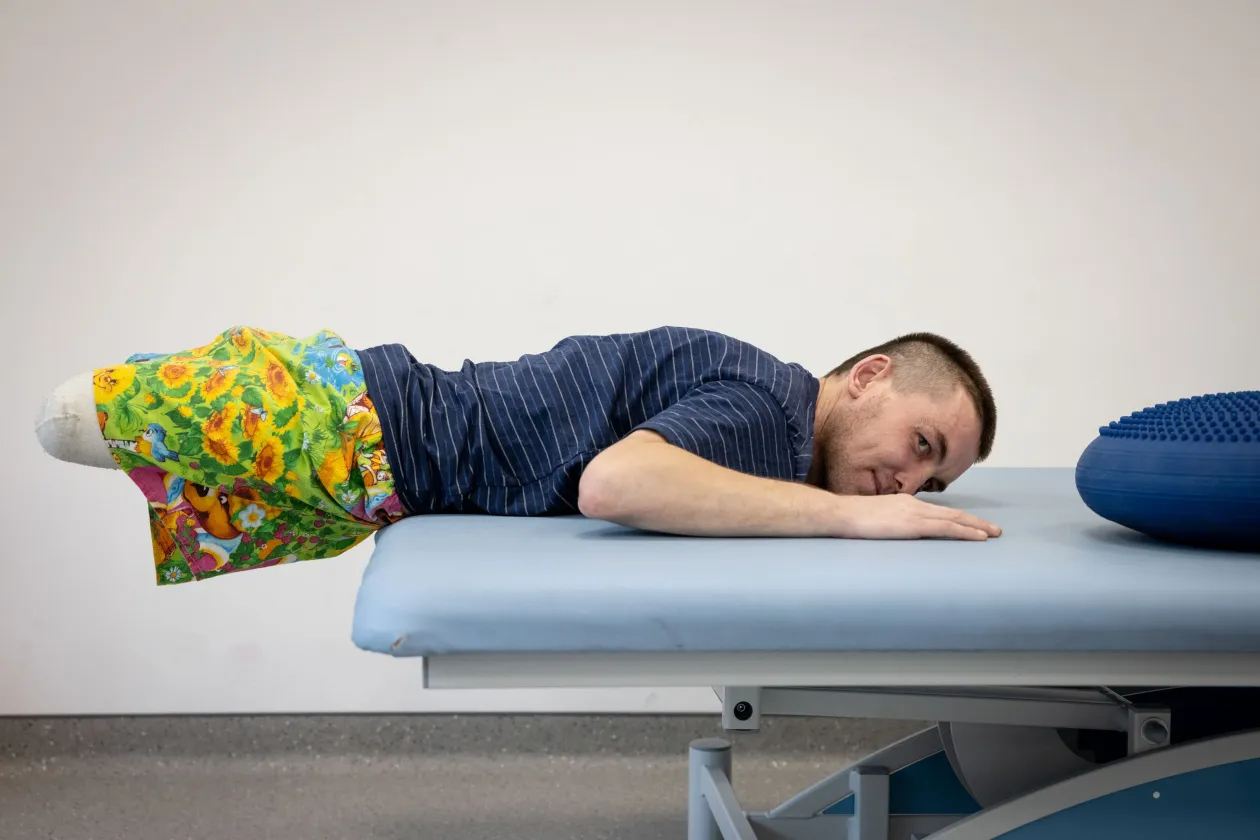
According to Darina Chernikova, a psychologist at Recovery, the psychological state of the patients depends largely on the stage of rehabilitation they are at. For those with recent injuries, the main goal is to get them to accept what their bodies can and cannot do. With those who have been injured for longer, the focus is more on how to reintegrate into society, how to communicate with family members or how to return to work. Research on the psychological state of decommissioned soldiers has long shown that people who have experienced war first hand often feel a sharp dividing line between themselves and civilians who have not. Chernikova sees it this way: „Many patients have difficulty in knowing how to relate to civilians, which can often lead to difficulties in socialization and reintegration. One of my patients put it this way: for him, there are two different worlds – one with those who have been on the front lines, and the other with those who have not.”
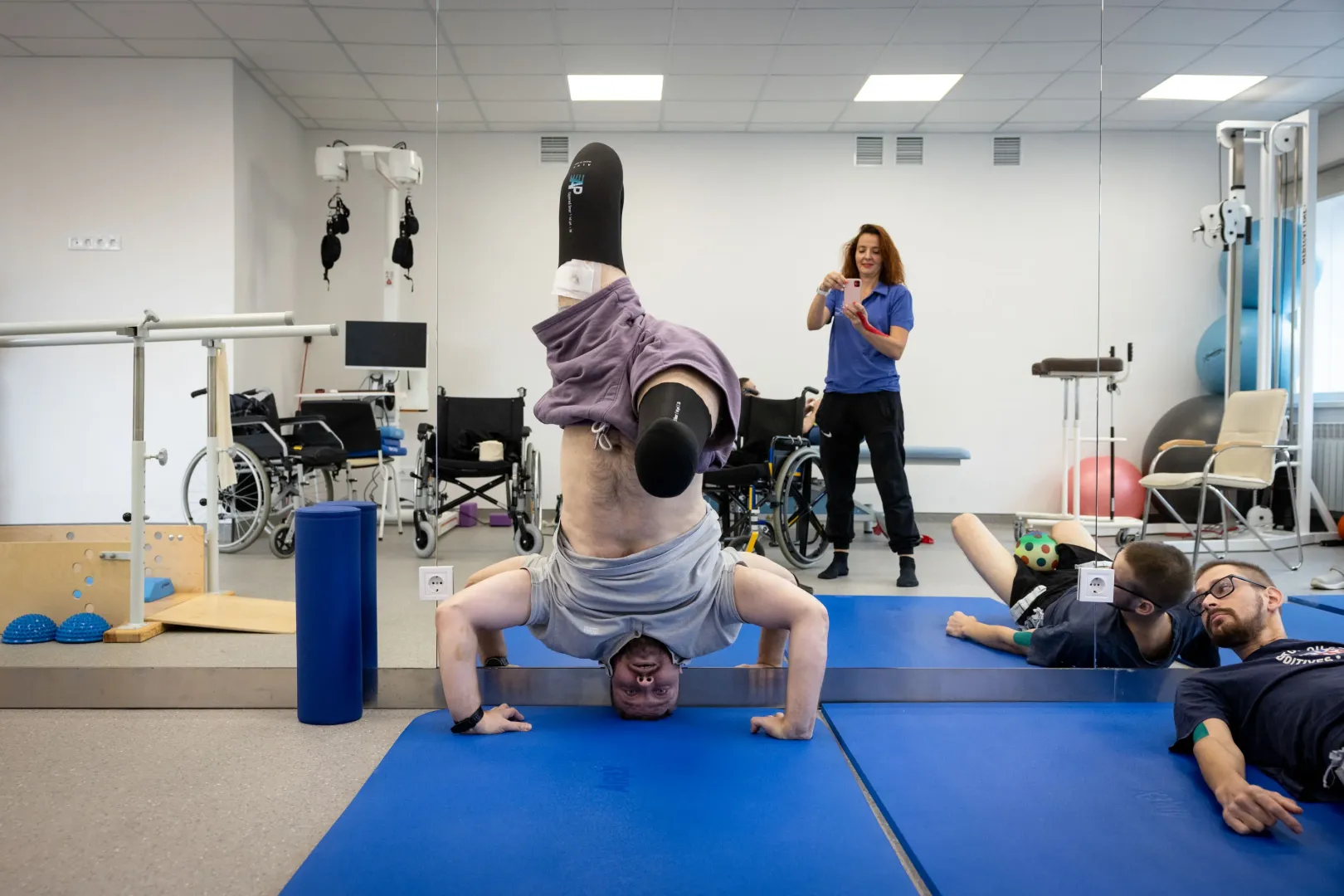
Reintegration into society is primarily an issue for those who do not return to fight. For those who continue to serve after rehabilitation, the most important goal is to stabilize their physical condition and address the potential for post-traumatic stress disorder (PTSD). In such cases, the therapy does not tackle deep issues, „the big questions of life”, says Chernikova. There is also a special third group: soldiers who, because of their injuries, are no longer in the army but would still like to return. „In such cases, it is important to understand what the motivation is: do they really want to go back, or is it just a reaction to the trauma?” Chernikova says it is a common misconception that much of rehabilitation is about treating PTSD, adding that PTSD does not affect everyone (her institute has few such cases partly because they get soldiers here soon after their injuries, and PTSD often develops later). Many suffer from anxiety, depression, aggression, frustrations about the future, grief and guilt. The reasons for the latter can be varied: some people feel guilty because they are recovering while others are on the front line, many struggle with the idea that they failed to save a comrade, that they failed to protect themselves, that their injury is a burden on their family, and some feel that they have not done enough for their country.
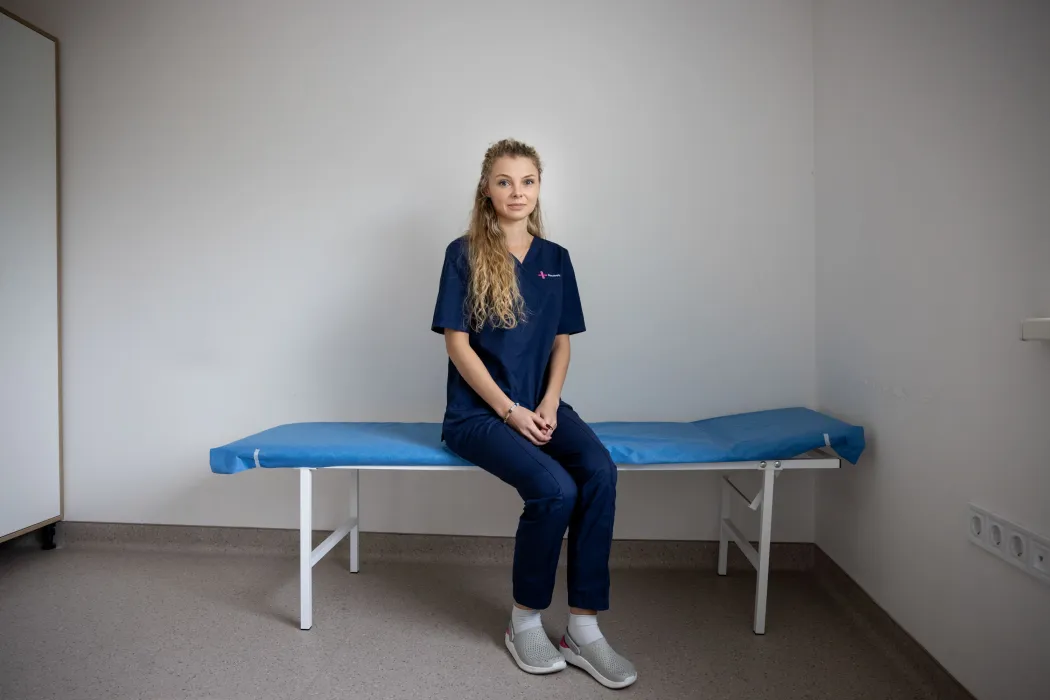
The sense of loss is also a complex emotion, partly because many people grieve on many levels at the same time: they grieve the loss of their comrades on the front, their own bodily losses, the loss of their home, their town or their fractured family. Dealing with aggression is also complex, because aggressive behavior can be a symptom of PTSD, but according to Chernyikova, there are also examples of people who, although not diagnosed with PTSD, are unable to control themselves, for example because of a head injury. Injuries often cause sexual dysfunction, so despite being a taboo subject, sexual rehabilitation is also important. The psychologist said that only two patients so far have ventured to include this topic in their therapy. The few weeks that most of them spend here are not sufficient for a comprehensive exploration, but the hospital's common areas are full of textbooks on the subject, and the professionals sometimes notice patients browsing through them.
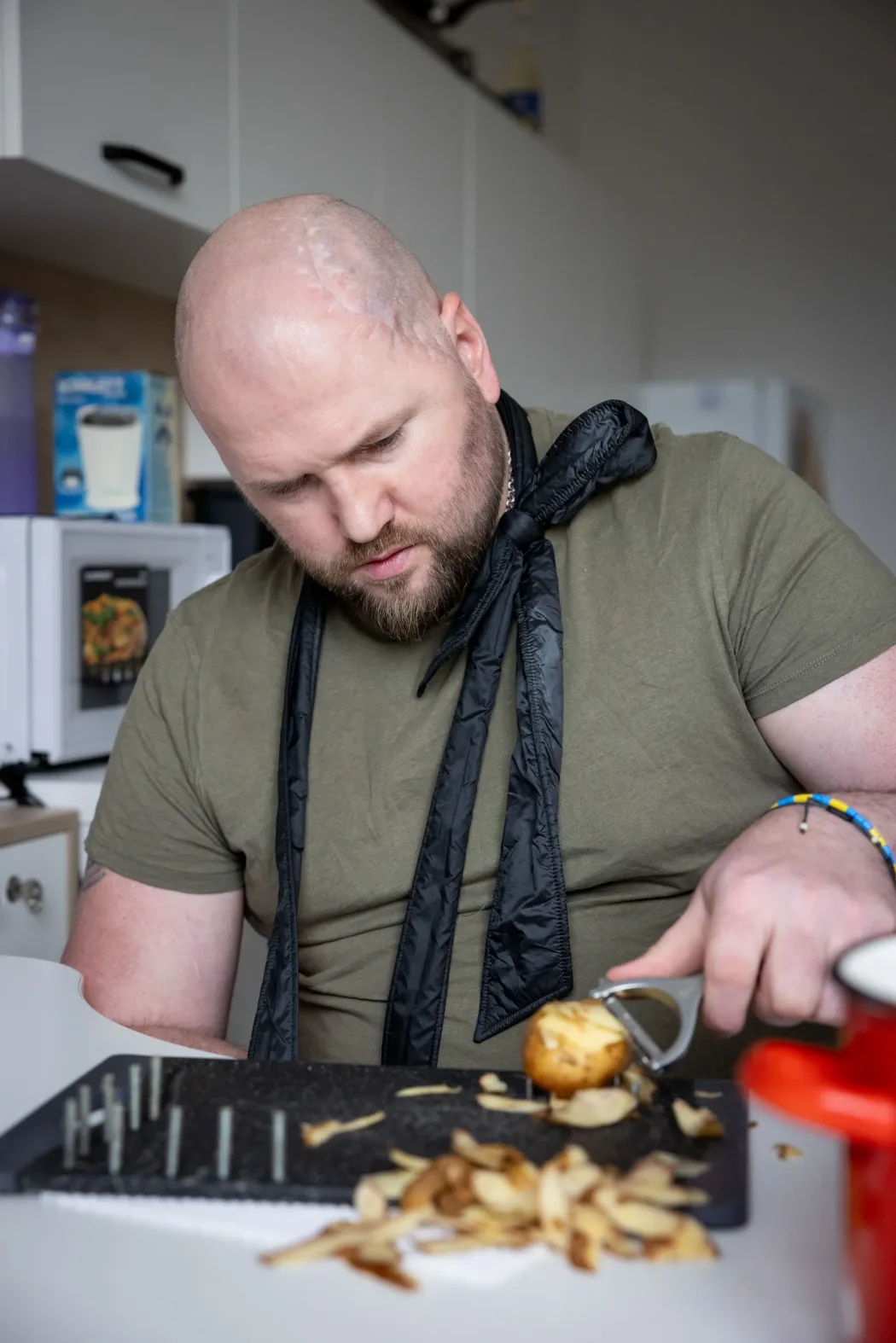
Recovery's psychologists also work with family members (many of whom are allowed to stay overnight with their husbands or sons if they have a serious physical injury), because their mental state can have a big impact on the rehabilitation process. According to Chernikova, the biggest difficulty for family members is the misconception that rehabilitation only takes a week or two. „They think that afterwards their husband or son will return to them, hoping that they will be 'normal again', which often leads to frustration, misunderstandings and conflicts.” Patience is needed if only because trauma to the brain can cause real changes in personality, just as trauma on the front lines alone can change the character and emotional state of soldiers. However, excessive support can also backfire. „It often happens, especially in mother-son relationships, that the family member starts to be overprotective of the patient, reporting to the doctors about every step he takes: we just got up, we just went to the other room, we just peed... It establishes too much control for the parent and smothering comfort for the patient, which makes it difficult to detach from the family member over time.”
II.
„Being a hero in times of peace, but fleeing from war – that's not my style. My heart dictated that I join the army.” Volodimir has been in the Unbroken rehabilitation center in Lviv for a year. A man in his fifties with a gravelly voice, who speaks a touch louder than others, ended up here after a landmine explosion. Not only were doctors unable to save part of his face and limbs, but he also suffered severe hearing loss. He proudly and cheerfully agrees to the interview, and the pronounced laughter lines on his face suggest that he smiles often. Sitting next to him is his mother, who quickly adjusts his clothes before the photo shoot. She remains the entire time and the two occasionally quibble in Ukrainian about exactly how and when the events took place.
Volodimir lived on the border of Kherson and Dnipropetrovsk oblasts until February 2022. He graduated as a biologist and geographer in the 1990s, but due to researchers' low salaries, he quickly changed careers, taking a job in the steel industry, where he remained. After Russia's invasion of Ukraine in 2022, he volunteered to help the army to locate Russian troops: his knowledge of geography was helped by his hobby of hunting, which gave him a good knowledge of the area. Often he found himself almost at arm's length from the enemy, but he says that during the first few weeks he was so driven by adrenaline that he even sought out dangerous situations. After a month and a half, he decided to join the army and became a professional reconnaissance officer for the Ukrainian intelligence service.
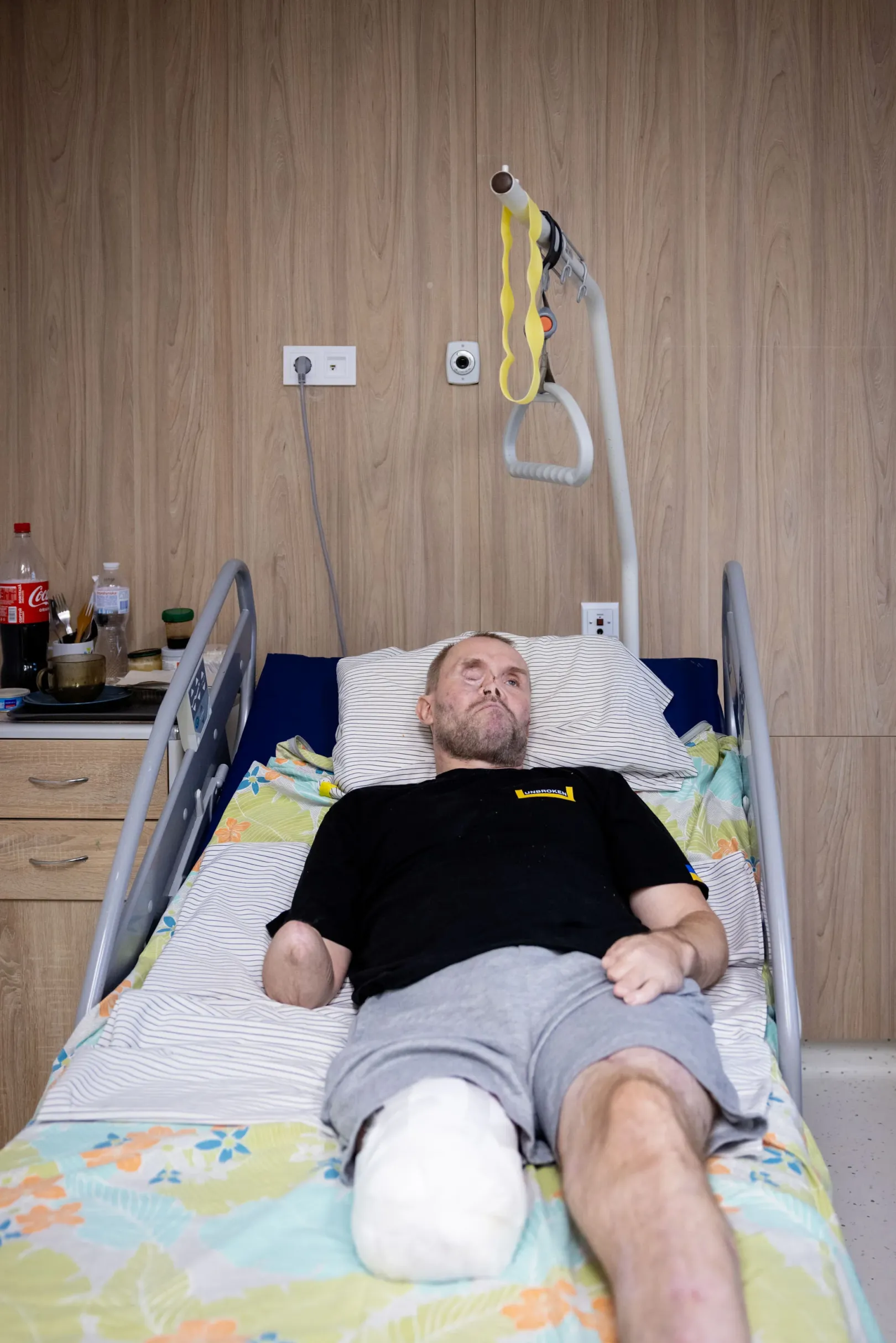
He has been seriously injured twice, both occasions he remembers vividly. On December 19, 2022, he was engaged in a firefight with some members of the Wagner mercenary group near Bakhmut when a mine exploded near him, wounding his left arm – he says as he rolls up his sleeve to show the one-and-a-half-inch-long scar. The second time took place on August 30, 2023, when a mine exploded next to him in Kharkiv province. It was there that he sustained all his other injuries, which he points out along his body. He received three medals after that, his mother interjects. For a long time, it looked like his right leg could be saved. Volodimir points to the rectangular scar on his left calf, from where doctors took skin for surgery on his right leg. In the end, it was the visiting American specialists who said that amputation was necessary.
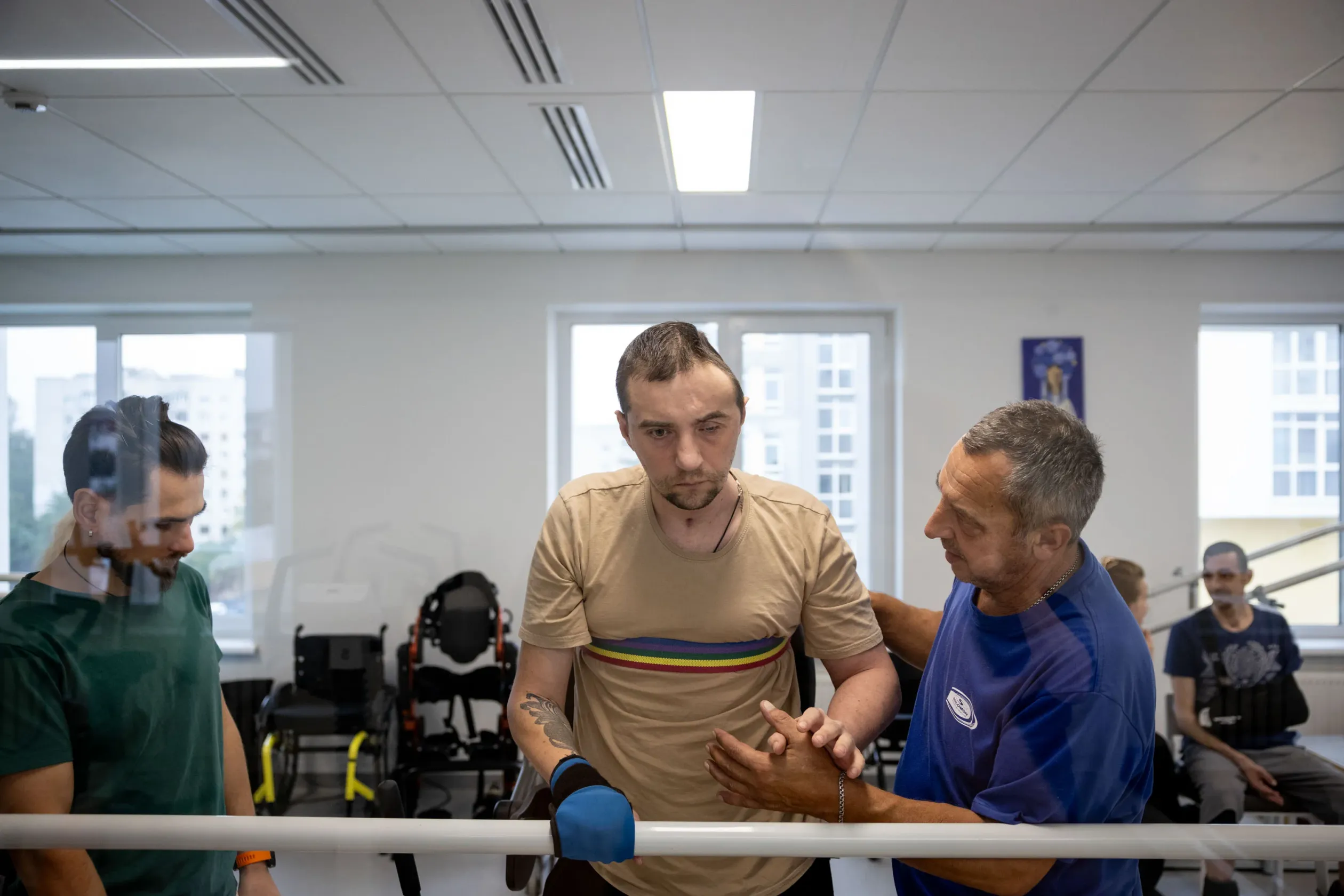
He spent a few weeks in a military hospital in early autumn last year, and has been with Unbroken for about a year. When asked about how he's feeling these days, he takes a long time to answer. Physically – he says finally – he's totally fine. But it's a challenge to figure out how to live without legs and arms, and he also finds it hard to imagine what his life will be like without ever being able to hunt or dive again.
Unlike at Recovery's centers, surgeries are also performed at Unbroken. Oleh Bilyanski, Unbroken's medical director, says that battlefield injuries are some of the most complex cases that their doctors have ever had to face. „It's never a matter of someone coming in with just a simple fracture or concussion. I keep thinking we've seen it all, but then something new comes along that we've never seen before. We recently had a man come in who had lost his sight, fractured his spine, had to have a limb amputated and had broken several bones. And we're talking about just one man's body.”
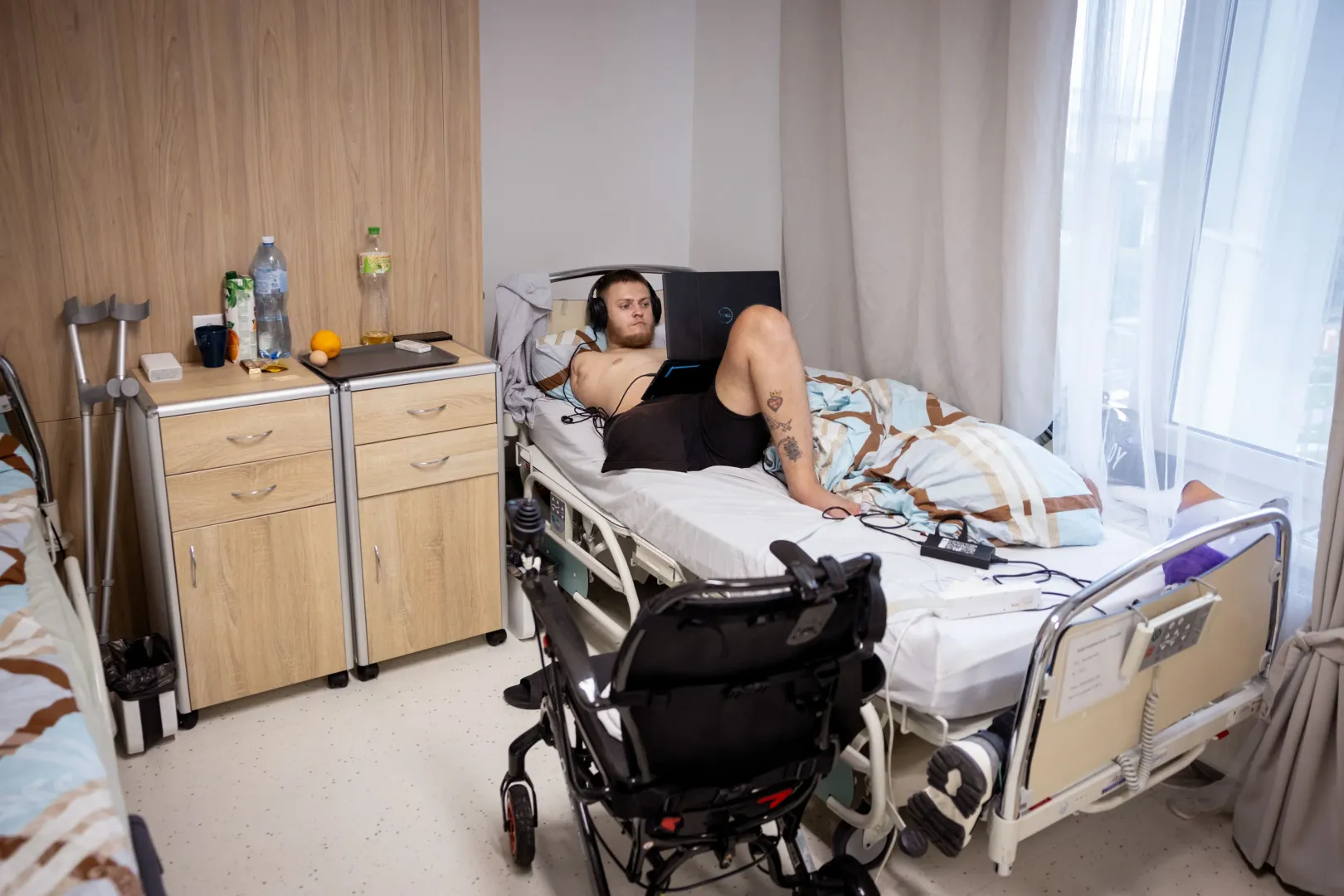
As with Recovery, Unbroken has a multidisciplinary team of experts, with five to ten doctors, speech therapists, physiotherapists and psychologists working with one person. The organization was established in the spring of 2022 at the initiative of the local hospital management and the mayor of Lviv, after realizing that the existing military hospitals and rehabilitation institutions would not have enough capacity to cope with the war. They have a total capacity of 200-250 patients and have so far rehabilitated 2,000 people. And since June 2022, they have been able to provide their own prostheses to help those who need it. The customized prostheses are made using 3D printers, but for now they can only produce the simplest components in-house: from the wrist down they can already make prostheses, while the more complex ones are sourced from German manufacturer Ottobock. At first, civilians also came from the eastern and southern areas most affected by the attacks, but now it is mostly soldiers. „Initially, we had a lot of civilian patients who were injured because instead of taking cover from the missile attack, they stayed outside to watch. That's human nature, it was interesting at the time – now, not so much,” says Bilyanski.
The medical director says that they rely on a lot of foreign specialists, mainly from the US, Canada, Israel and the UK. Many of them even visit in person – for example, a team of Australian and American doctors are due to arrive soon for a few weeks to help Unbroken's new spinal surgery unit as soon as it opens. They also get a lot of help from a team of Canadian doctors, with whom they share their toughest cases of the week every Friday.
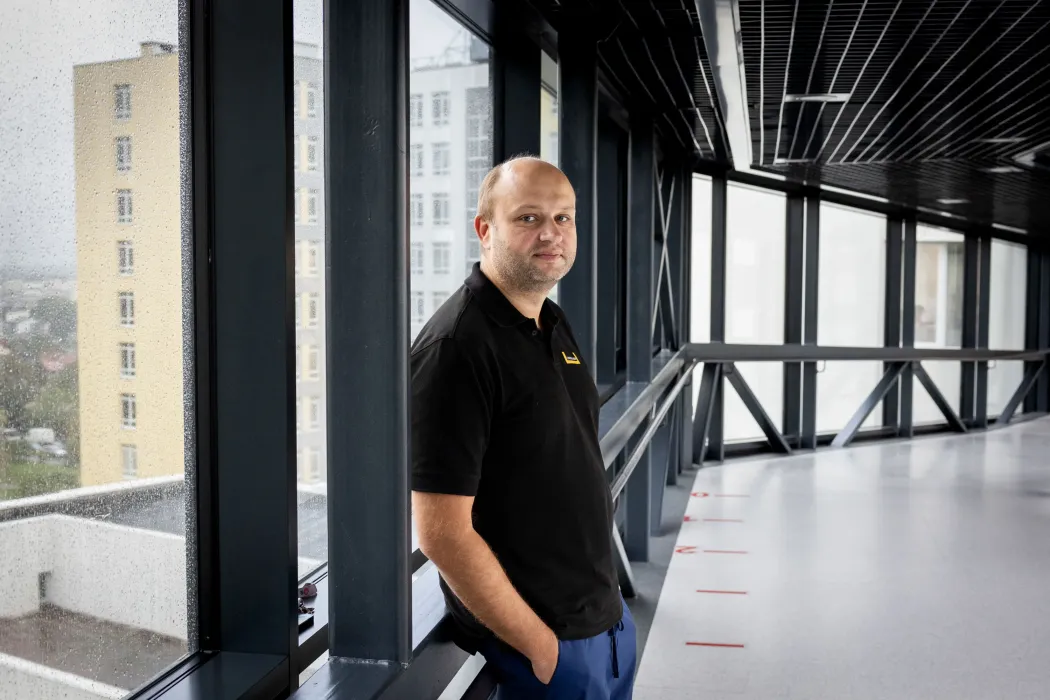
According to Bilyanszki, however, their doctors have also gained so much experience over the past two and a half years that it is now more of a back-and-forth exchange of knowledge. „We are very fortunate to have the possibility to communicate with experts from other countries, to be able to call them at any time. Sometimes they supervise our work, sometimes they give us advice, and sometimes we just simply chat, because that in itself relieves some of the pressure and stress we feel. Sometimes it is important to hear someone say: you did everything you could.”
III.
In the book mentioned above, Judith Herman writes that traumatic events are not said to be „extraordinary” because they occur rarely, but rather because they overwhelm the ordinary human adaptations to life. Psychological trauma is characterized by intense fear, a sense of helplessness, loss of control and the threat of annihilation: traumatic reactions occur when human action is futile, when neither resistance nor escape is possible, when the human self-defense system is overwhelmed. People who have experienced trauma feel and act as if their nervous system has become detached from the present. Traumatic memories do not function in the same way as adult memories, i.e. they do not fit into a continuum of life, they have no context, but are encoded in the form of vivid feelings and images. Somewhat like the memories of young children.
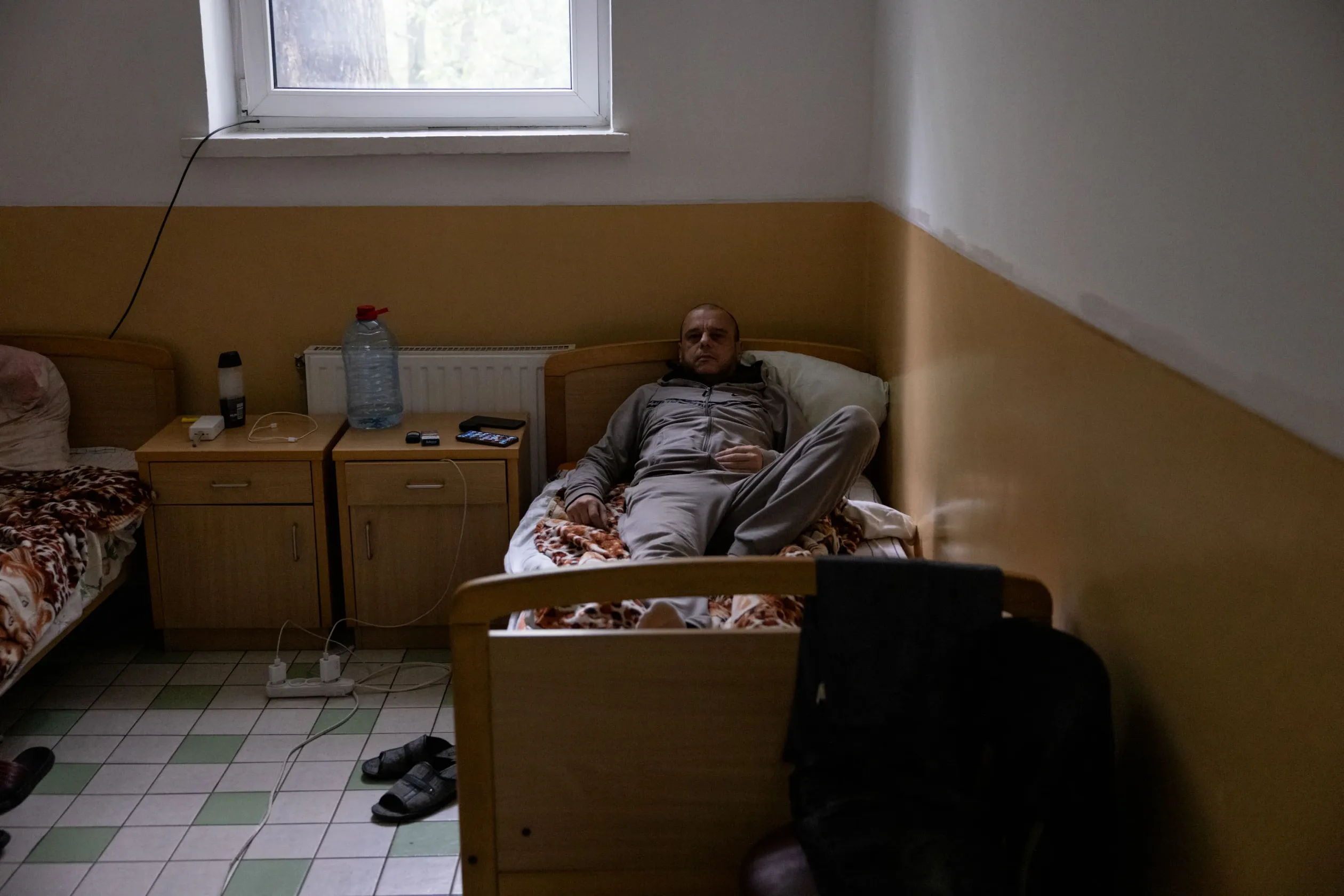
People who experience horrific events therefore suffer predictable psychological trauma. This is particularly true of war, and the trauma researcher writes that the reality of psychological trauma was forced back into the public consciousness by the catastrophe that was the First World War. This followed 19th century research, including Sigmund Freud's therapeutic work on women with hysteria. After the First World War, doctors around the world were confronted with a startling rate of breakdowns among men who had experienced the horrors of war. Doctors initially attributed the symptoms (screaming, sobbing, immobility, muteness, loss of consciousness, lack of emotion) to physical causes – a phenomenon that one English psychologist described as 'shell shock', suggesting that the soldiers had suffered concussions as a result of the explosions. Once it became clear that the symptoms were also present in people who had not suffered any external physical trauma, military psychiatrists slowly came to realize that the symptoms of shell shock were caused by psychological trauma. Medical interest in combat neurosis was revived after the Second World War: in 1946, two American psychiatrists, J.W. Appel and G.W. Beebe, concluded that 200-240 days in combat were enough to break even the strongest soldier. „There is no such thing as 'getting used to combat'. Each moment of combat is a strain so great that men will break down in direct relation to the intensity and duration of their exposure. Thus, psychiatric casualties are as inevitable as gunshot or shrapnel wounds in warfare,” they wrote.
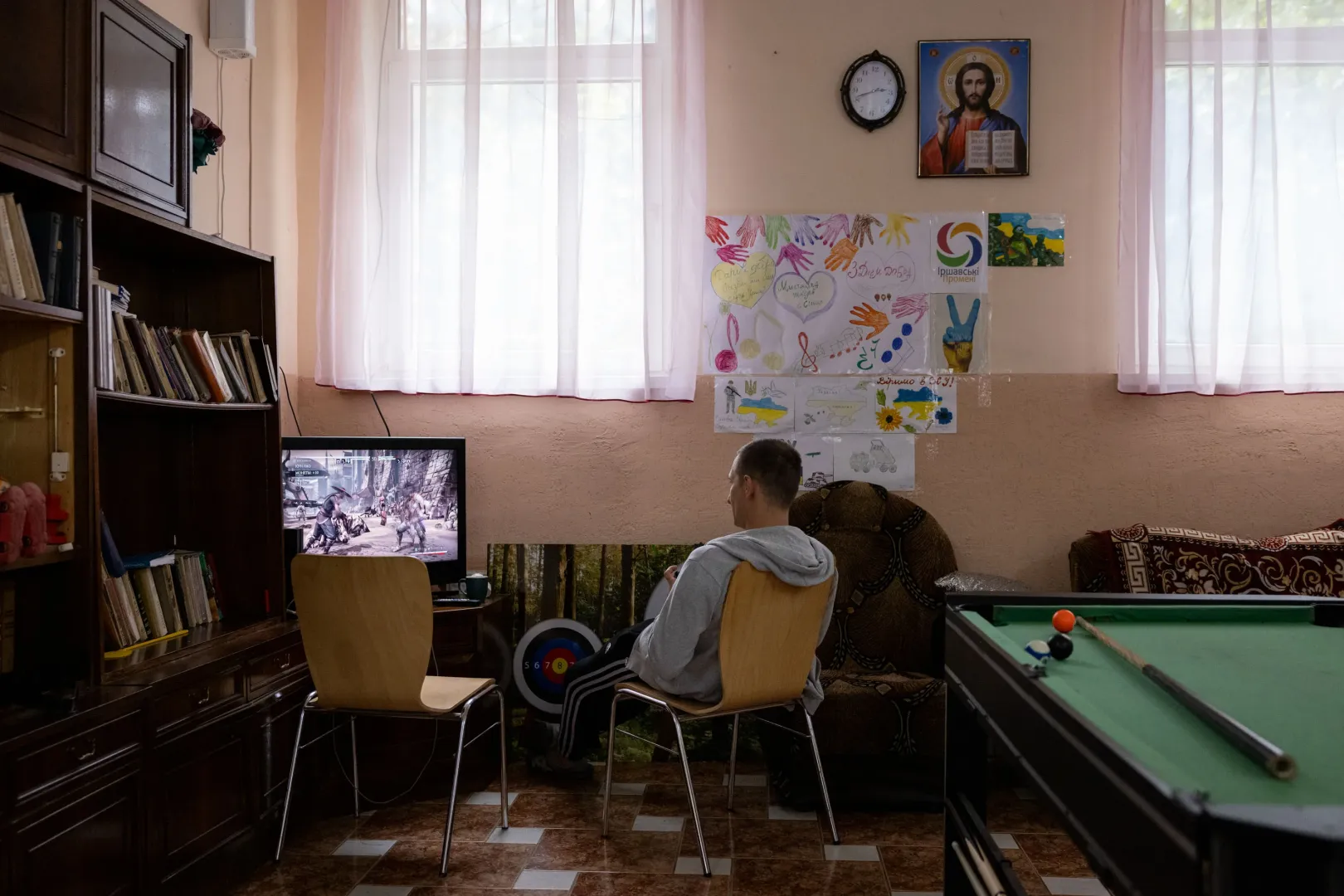
It is no wonder that, in addition to complex rehabilitation centers, psychiatric wards in Ukrainian hospitals are also extremely overburdened. This is also the case in the three psychiatric wards of the hospital in Uzhhorod: the Berehove, Chikosh-Horonda and Uzhhorod units. When we visited the latter, a new building was being added to accommodate more soldiers, but there are also plans to renovate the unit in Chikosh-Horonda.
Compared to general rehabilitation centers, psychiatric clinics understandably have a much higher proportion of PTSD patients: psychiatrist Elvira Kovács, head of the psychiatric clinic in Chikosh-Horonda, estimates the percentage of soldiers diagnosed with PTSD at her institution at 80 percent, with a third of cases involving aggression. Their job is also made more difficult by the fact that the vast majority of soldiers here will return to the front lines unless psychiatrists determine that they are too unwell to continue serving. According to Elvira Kovács, in 2022 there were still many who expressly wanted to go back to the fight after their recovery, but today far fewer. In fact, for many, the very thought is hard to bear. „We are tired. The patients are tired, and the doctors are tired,” she says. The situation for doctors is made more difficult by the fact that they can hardly find any workers (nurses, cleaners, etc.), as women from the surrounding municipalities have gone abroad and men have been drafted. They have colleagues who have been called up as well. „One person now works as much as two people used to,” adds Ilya Persan, head of the military department of the psychiatric clinic in Chikosh-Horonda, who, after hiding in a cellar from the Russians for nearly a month, fled Mariupol with his family in 2022, leaving everything behind.
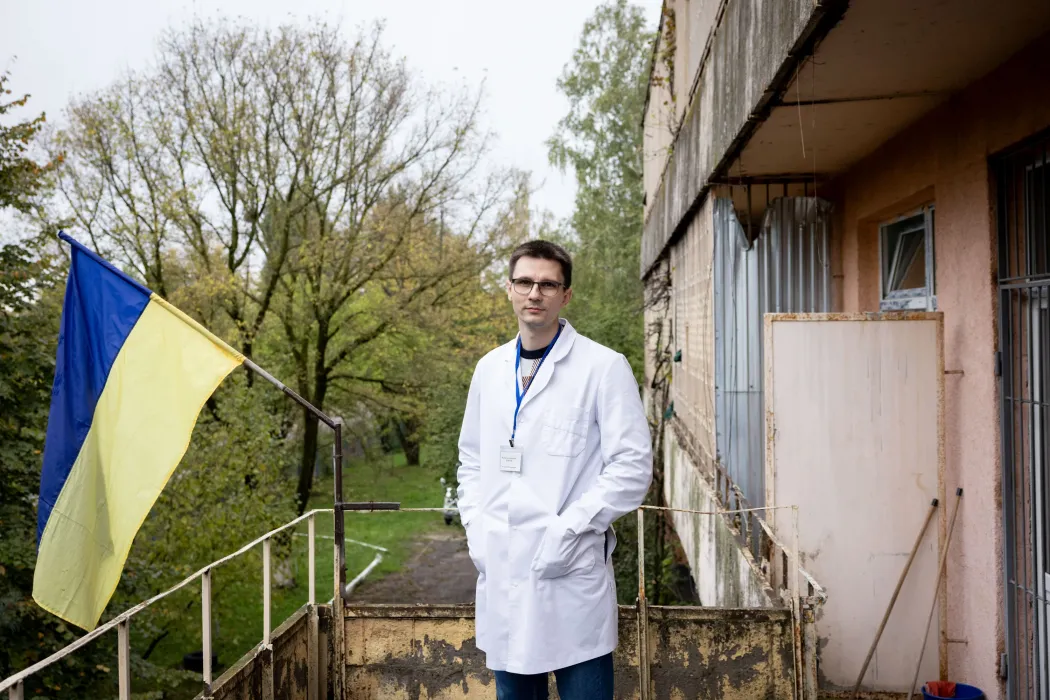
„This war is very different from the ones we have studied in scientific literature. The American Psychiatric Association has treatment guidelines based on the experiences of the war in Vietnam and Afghanistan, but this war brings out different symptoms in soldiers, so the therapeutic approach has to be adapted to these experiences,” says Vladyslav Pliekhov, psychiatrist, psychotherapist from Zaporizhzhia and current medical director of the Uzhhorod clinic. Pliekhov says, for example, that the proportion of people diagnosed with so-called complex PTSD is much higher than what psychiatrists in the US have experienced. Complex PTSD has a higher rate of emotional imbalance, and such patients can often be dangerous to others. There is also a higher prevalence of depression associated with PTSD and a much higher proportion of patients treated for addiction than in the US.
PTSD symptoms are varied: many individuals report difficulty sleeping, frequent nightmares recalling traumatic moments, flashbacks (indelible imprinting of the traumatic moment), avoidance of interactions that evoke the traumatic event, tormenting guilt over the loss of comrades on the front line, heightened anxiety-induced alertness, such as overreaction to noise. „Here, 1,300 kilometers from the front, it once happened that a patient heard the sound of a helicopter and threw himself to the ground, covering his head with his hands. In such cases, they lose their orientation in space and time for a minute,” he says. Many people are also admitted to psychiatric hospitals because of mental illness caused by head trauma, which often goes hand in hand with PTSD – a combination that Pliekhov says makes it very difficult to treat such patients.
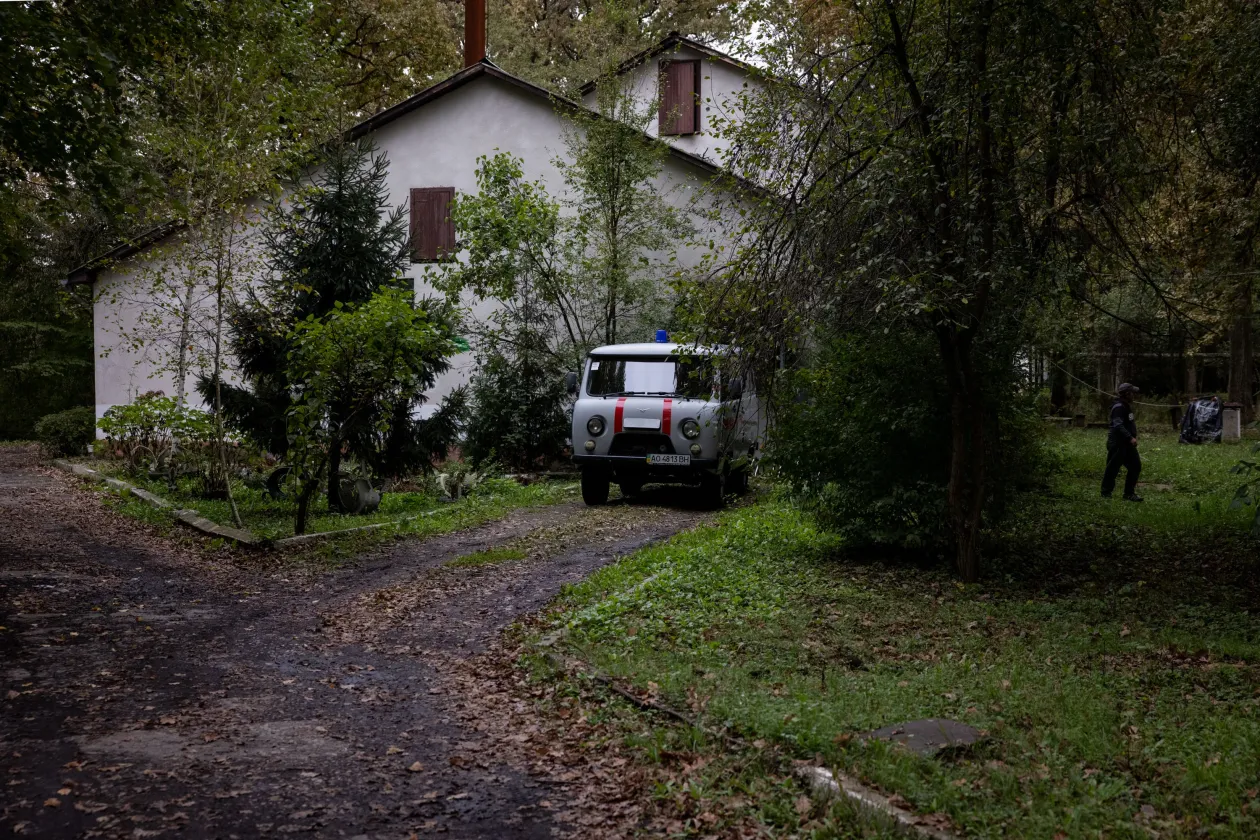
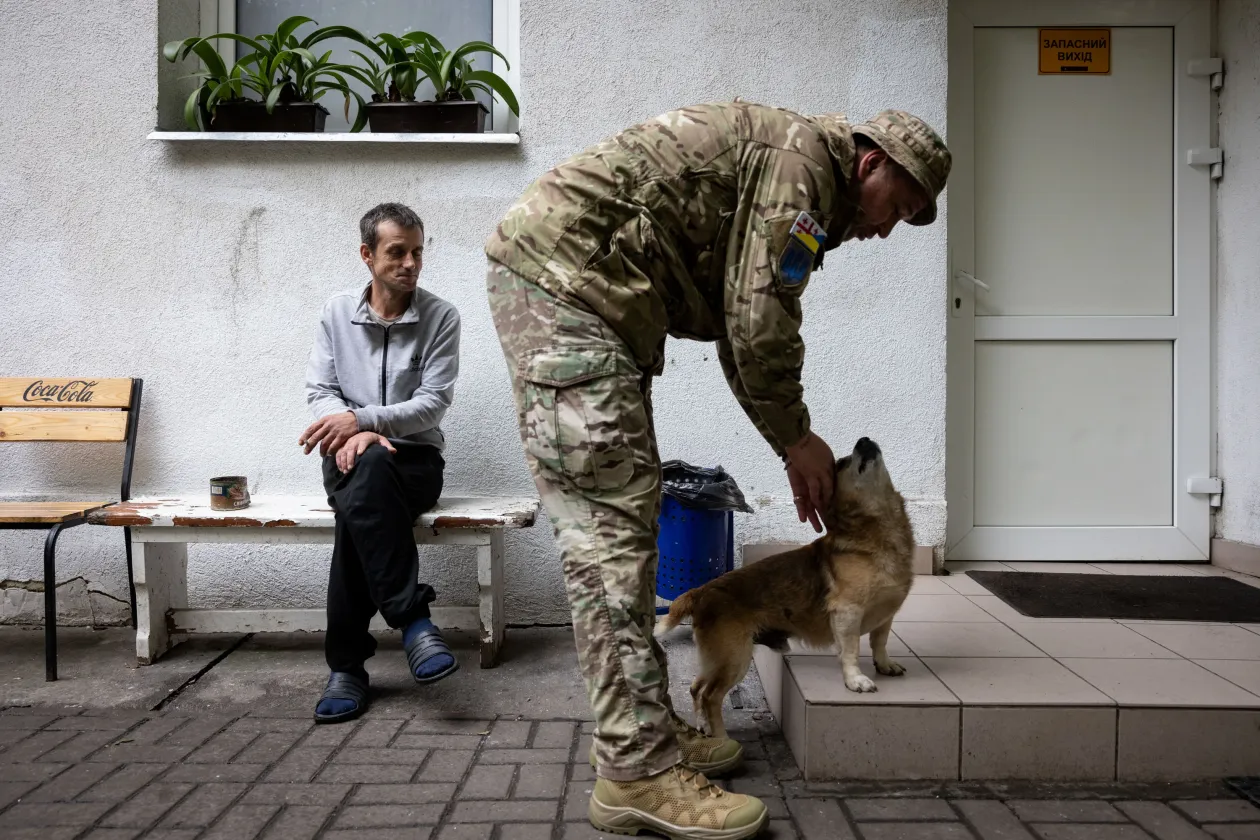
„You have to think of trauma as a brick or a Lego block, each traumatic event is another component of the building,” he says. „In this war, the buildings of our soldiers have a lot of bricks, which are being stacked very intensely and rapidly. We have a lot of patients who come to us following a very rapid progression of events.” Pliekhov's professional view is that PTSD cannot be completely cured. „Even if our patients' states improve significantly after treatment, some symptoms of the condition will remain forever, even if they do not meet the official diagnostic standard for PTSD as measured in a hospital.”
IV.
Although he currently lives in Kyiv, Olympic silver medalist swimmer Denis Silantyiev regularly returns to his hometown of Zaporizhzhia, where he and his team provide swimming therapy to injured soldiers and veterans. In 2022, they started providing therapy to the children of refugees and soldiers, and in August this year they launched a rehabilitation program for soldiers. The former swimmer and politician (a member of parliament for the left-wing populist party, Radical Party, of Oleh Lyashko from 2014 to 2019) has been involved in swimming therapy for more than 20 years, and wrote his PhD thesis on the subject in 2001, a year after winning an Olympic silver medal.
Silantyiev is not present at every single therapy session in Zaporizhzhia. They are conducted by his former coach with the help of other swimming coaches. „The goal is not to swim, but to improve their mental and physical condition by being in the water. Many are depressed or feel abandoned. These sessions are a bit of a boost for them,” he says. As everyone's physical abilities are different, participants are given individual tasks, although the therapy itself is done in a group setting – an important part of the therapy is that veterans here feel they are in a familiar and comfortable environment. The coaches assess what problems, injuries and illnesses each participant has, and then, in consultation with doctors, they put together an individual exercise program. The first few sessions are almost always exhausting, even painful, but Silantyiev says swimming therapy shows participants how to put in the work to achieve their goals and then apply that same energy to other areas of their lives.
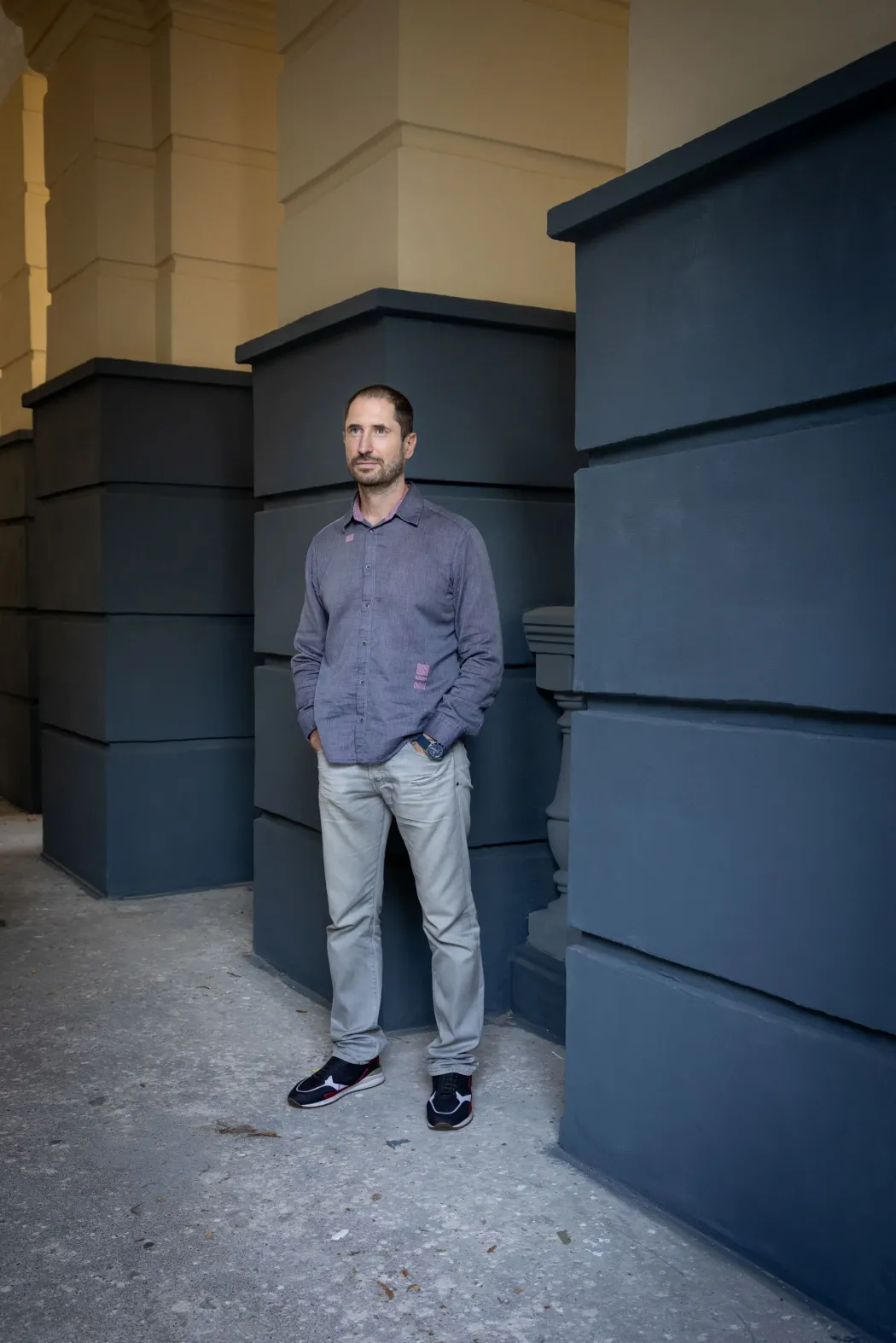
The ex-swimmer's initiative is not unique: since 2014, numerous NGOs have been set up in Ukraine to help decommissioned soldiers. Unlike rehabilitation centers, these are not aimed at physical and psychological rehabilitation, but at helping men and women who have been in military service for years to reintegrate into society and return to their everyday lives. The effort is justified: it is estimated that there are now more than five million veterans and their families in Ukraine, a country of 44 million people.
After deciding not to return to the former eastern front at the end of 2015, Alina Vyatkina, the young veteran whose story started this article, continued her university studies in Lviv. „For me, I had missed out on those carefree university days when you just party and are satisfied with everything in life. There was a lot of partying in the dorm, but all I remember was how distracted I was by the noise and not being able to sleep – on the front, sleep was more important than anything else. Using public transport was also a problem, and I began to develop symptoms similar to panic attacks.” The university doctor diagnosed her with PTSD and prescribed some medication, which improved her symptoms. But Alina still felt disconnected from others. It was a lecture on combat trauma that had been advertised on Facebook that finally lifted her out of this condition, and soon after she started attending self-help groups with other veterans. She also started psychotherapy in the meantime. This helped her to process her childhood experiences, which was important because they led her to volunteer as a military nurse. Eventually, she too found work in veterans' organizations.
Today, the organization she runs, Vilʹnyy Vybir, helps veterans and their families through group and individual therapy (trauma-focused therapy and cognitive behavioral therapy), support groups and a variety of training sessions. Last year, they also developed an app to help alleviate symptoms of depression, anxiety and panic attacks and to direct users on when to seek help from a psychologist. Alina says that for many people, the app really is the first step, and after that they are more likely to seek professional help.
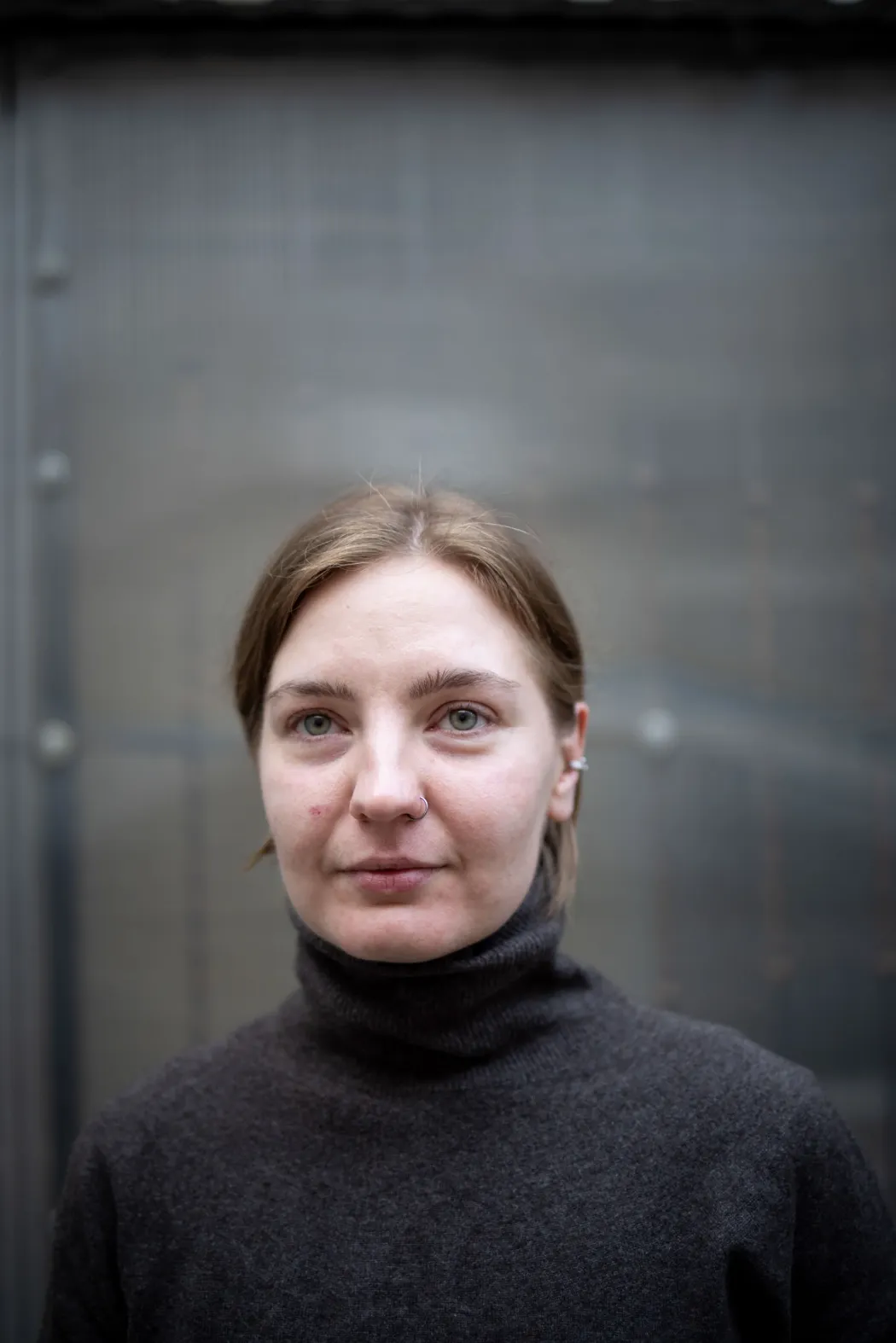
„When trauma takes place, the brain can't place the event in the past, so the body constantly wants to react because the traumatic event is 'frozen in time'. The goal of therapy is to get the brain to situate the memory, to integrate the event into one's life history, but we also work on the triggers that can bring on PTSD symptoms,” she says. Alina, like other psychologists, points out that PTSD does not affect everyone (there are no Ukrainian statistics, but US statistics show a 20 percent rate among veterans) who mainly seek help for anxiety, depression and exhaustion. In addition, many have relationship problems: it is difficult to maintain a relationship for three years in which one partner lives a completely parallel life on the front lines. Of course, it's not only about memories of combat: „It's a very serious decision to join the army, and one cannot base it on superficial motives. There are usually deep-rooted reasons, so it's important to explore these during therapy.”
As for the overall mental state of Ukrainians, she says the first year was one of anxiety, and the second was one of depression and apathy. „At first, everyone was in shock, we were witnessing terrible things and no one knew what to do, which caused enormous anxiety. Then people realized that the war was going to drag on. We heard so many stories of the tragedies the nation was going through, and then grief, sadness and depression began to permeate the country.” Alina said many psychologists expected the third year to be even more severe, as it is evident how exhausted people are from the war. Experts speculated that many people no longer had the resources to cope with everyday life. „It is perhaps too early to draw any conclusions, but to our surprise, we still haven't seen the situation worsen. However, many people are asking for help because of chronic stress and general exhaustion, or because it is impossible to plan, given how much people's lives are tied to the outcome of the war. I honestly have no idea how people are still able to cope. But somehow they are.”
In the next part of this series, we will look at the impact of the war on civilians in general and on some of the more vulnerable groups in particular: children who have been deported from the occupied territories to Russian foster care, internally displaced persons and people released from Russian captivity.
This article was produced with the financial support of the European Union. Telex is solely responsible for its content and under no circumstances should it be taken to reflect the position of the European Union.